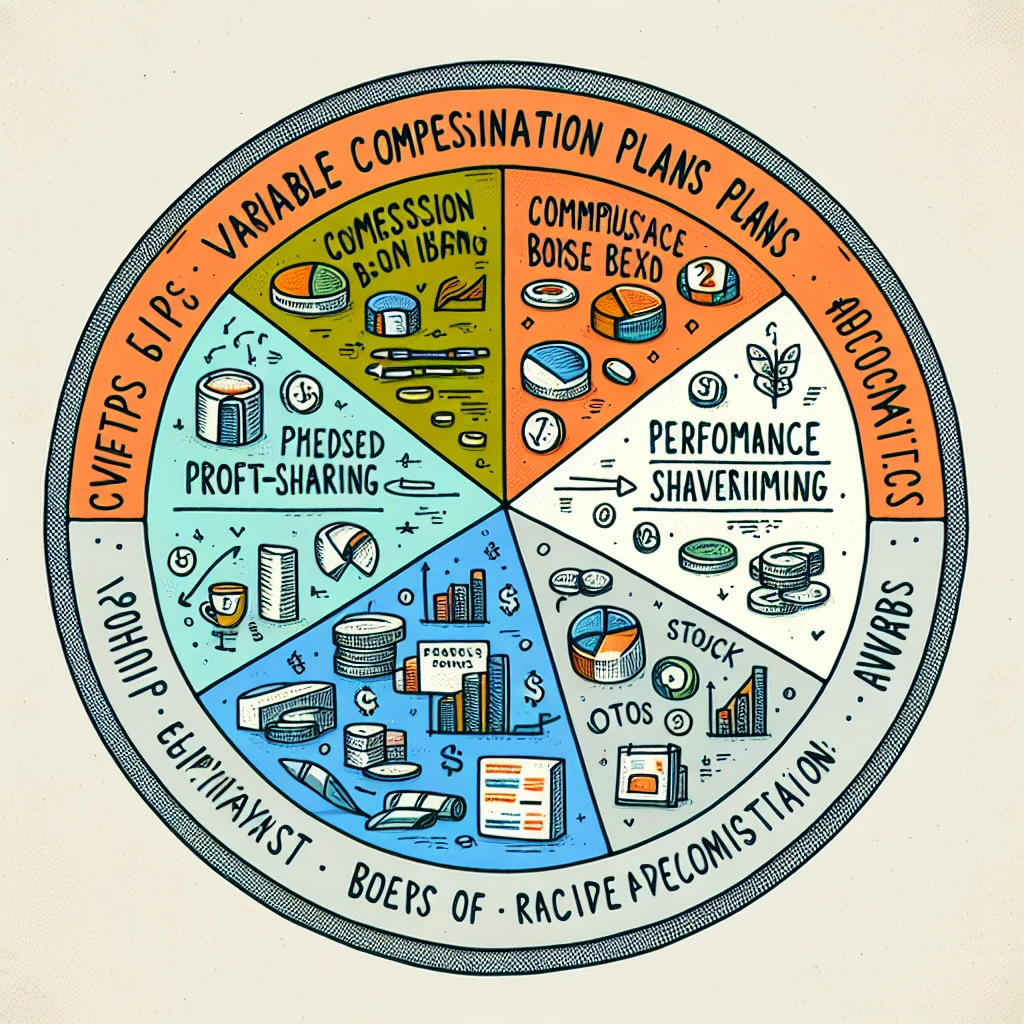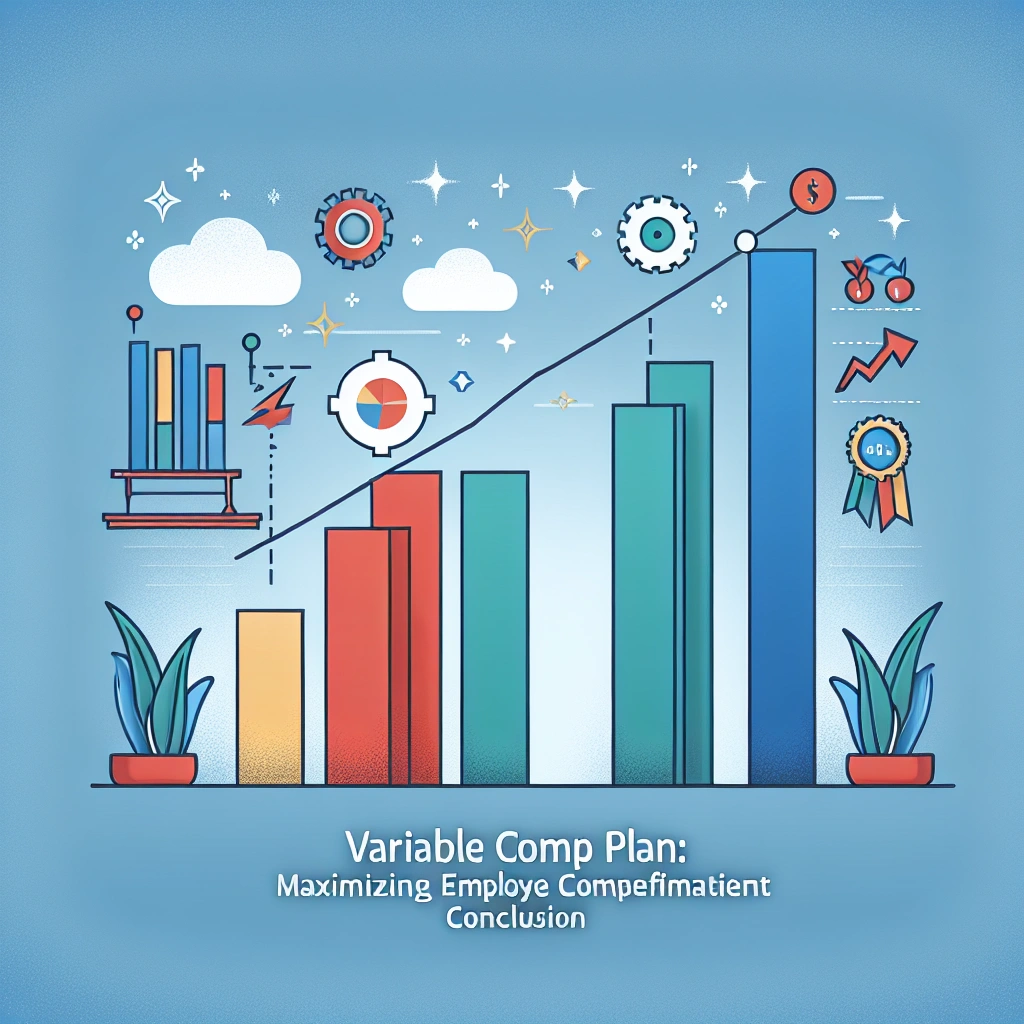Variable Comp Plan: Maximizing Employee Engagement
Short Answer
Yes, a variable comp plan is a form of pay that can change between pay periods, typically adding 8% to 19% to an employee’s base salary.
Variable comp plan is a form of pay that can change between pay periods, typically adding 8% to 19% to an employee’s base salary.
Employee engagement is crucial for organizations as it helps create a positive work culture, reduce turnover, increase productivity, build better relationships, and impact company profits.
Check out this Youtube video: “If you want to learn how variable compensation plans can help increase your salary and improve your financial incentives, then you should definitely watch this video on ‘Variable Compensation Plan, Salary Incentive Calculator’.”
Key Takeaways on Variable Comp Plan
-
Variable compensation plans can boost productivity by incentivizing employees to achieve or exceed their targets.
-
Implementing variable compensation can improve employee engagement through transparent communication, regular feedback, and recognition.
-
Variable compensation plans promote healthy competition, driving employees to enhance their skills and maximize their potential contributions.
-
A potential disadvantage of variable compensation plans is the unpredictability of variable payments, which can impact profitability.
-
Well-designed variable compensation plans can drive employee engagement and align individual goals with organizational objectives.

Top 5 Types of Variable Compensation Plans
Variable compensation plans are essential for rewarding employees based on their performance and achievements. Here are the top 5 types of variable compensation plans that companies often utilize:
Bonus
Bonuses are one of the most common forms of variable compensation. They are typically awarded to employees for exceeding performance targets, achieving milestones, or contributing exceptional results to the company.
The bonus structure can vary, ranging from individual performance bonuses to company-wide profit-based bonuses. For instance, a salesperson may receive a bonus for surpassing their sales targets, while a manager could be eligible for a bonus tied to the company’s overall profitability.
Incentive
Incentive compensation encompasses a broad spectrum of rewards, including commissions, profit sharing, and stock options. Commissions are particularly prevalent in sales-oriented roles, and they directly link an employee’s earnings to their sales performance.
Profit sharing, on the other hand, allows employees to share in the company’s financial success, aligning their efforts with the organization’s profitability and long-term growth.
Recognition
While not typically seen as a traditional form of variable compensation, recognition-based rewards play a crucial role in motivating employees. Recognition programs acknowledge outstanding efforts, exceptional teamwork, and significant contributions to the organization.
These may include public acknowledgment, plaques, and even extra paid time off, fostering a culture of appreciation and excellence.
Management by Objectives (MBOs)
Management by Objectives (MBOs) is a strategic approach to performance management, aligning an employee’s objectives with the organization’s goals. It involves setting specific, measurable, achievable, relevant, and time-bound (SMART) objectives that directly influence variable compensation.
When employees achieve their MBOs, they become eligible for bonus payouts or other forms of performance-based rewards.
Profit-sharing
Profit-sharing plans allow employees to gain a direct stake in the company’s financial success. This may include profit-sharing pools, 401(k) contributions, or stock ownership programs.
By linking employee rewards to the company’s overall profitability, profit-sharing plans emphasize a shared sense of ownership and incentivize employees to maximize their contributions to the organization’s success.
A well-structured variable compensation plan can effectively drive employee engagement, foster a performance-driven culture, and align individual efforts with the organization’s strategic objectives.

3 Key Advantages of Variable Compensation
Variable compensation plans offer numerous advantages that can greatly benefit both employees and the organization as a whole. Let’s dive into the 3 key advantages of variable compensation.
Boosts productivity
Implementing a variable compensation plan can significantly boost productivity within the workforce. When employees are incentivized with the opportunity to earn additional income based on their performance, they are motivated to enhance their productivity levels.
This leads to a more driven and focused workforce that is determined to achieve or exceed their targets to reap the benefits of the variable compensation plan. For instance, a sales team operating under a variable compensation plan is likely to demonstrate heightened productivity as they strive to surpass their sales goals, ultimately driving revenue growth for the company.
Moreover, variable compensation serves as a powerful tool to align employees’ goals with the organization’s objectives. By linking rewards directly to performance, employees are encouraged to concentrate on tasks that contribute most to the company’s success.
As a result, there is a natural inclination toward increased productivity, as individuals prioritize actions that yield the greatest impact on achieving organizational goals.
Another advantageous aspect of variable compensation is its adaptability to changing business needs. In dynamic industries where corporate goals and market conditions fluctuate, the variable compensation plan can be adjusted to focus on specific areas that require immediate attention, thereby channeling employee efforts towards addressing crucial business priorities.
Additionally, variable compensation plans can foster a culture of continuous improvement where employees are driven to enhance their skills and performance in order to maximize their variable pay, ultimately contributing to a more efficient and productive workforce.
Improves employee engagement
Variable compensation plans play a pivotal role in improving employee engagement across the organization. By offering a direct link between performance and rewards, employees feel a heightened sense of ownership and accountability for their contributions.
This instills a strong sense of empowerment and motivation, leading to increased engagement and commitment to achieving individual and organizational goals.
Furthermore, variable compensation plans facilitate transparent communication regarding performance expectations and the correlation with rewards. This transparency creates a fair and equitable environment where employees understand the criteria for unlocking additional earnings, fostering a sense of trust and satisfaction in the compensation structure.
An essential element of employee engagement is the opportunity for continuous feedback and recognition. Variable compensation plans provide a platform for regular performance evaluations and constructive feedback, allowing employees to consistently track their progress and address any areas requiring improvement.
This ongoing dialogue fosters a supportive and encouraging work environment, propelling employee engagement and morale.
Moreover, variable compensation plans can be tailored to recognize and reward exceptional performance, further motivating employees to strive for excellence and actively contribute to the overall success of the organization.
Promotes healthy competition
One of the key benefits of a variable compensation plan is its ability to promote healthy competition among employees. When individuals have the opportunity to earn additional rewards based on their performance, it naturally cultivates a competitive spirit within the workforce.
This healthy competition can drive employees to continuously enhance their skills, innovate, and maximize their potential contributions.
Furthermore, the presence of a variable compensation plan encourages collaboration and knowledge-sharing among employees. While competition exists, it is complemented by a collective pursuit of organizational success, leading to a harmonious balance between individual achievement and team collaboration.
This fosters a workplace culture that values mutual support, teamwork, and camaraderie.
By fostering a competitive yet collaborative environment, variable compensation plans contribute to a more dynamic and energetic workplace where employees are motivated to excel while nurturing positive relationships with their colleagues. This balanced competitive spirit promotes innovation, creativity, and a drive for continuous improvement, ultimately benefiting the organization as a whole.
The implementation of a well-designed variable compensation plan is instrumental in boosting productivity, improving employee engagement, and promoting healthy competition within the workforce. This not only benefits individuals by providing tangible rewards for their efforts, but also contributes to the overall success and growth of the organization.
To illustrate the advantages of variable compensation in a clear and concise manner, the following table outlines the key benefits associated with variable compensation plans:
| Advantages | Description |
|---|---|
| Boosts productivity | Enhances workforce productivity and aligns individual goals with organizational objectives. |
| Improves employee engagement | Drives employee engagement, empowerment, and motivation through direct correlation between performance and rewards. |
| Promotes healthy competition | Cultivates a healthy competitive spirit while encouraging collaboration, innovation, and mutual support. |
2 Major Disadvantages of Variable Compensation
Variable compensation plans, while offering flexibility, come with their drawbacks. Let’s explore two major disadvantages associated with variable compensation plans.
Can be less profitable
Variable compensation plans can lead to lower profitability due to the unpredictable nature of variable payments. Since these payments are tied to employee performance, they can fluctuate, making it challenging for businesses to forecast and allocate financial resources accurately.
This inconsistency in expenses may result in financial strain, affecting the overall profitability of the organization. Moreover, during periods of underperformance, maintaining consistent profit margins becomes precarious as fixed costs remain while variable expenses increase, impacting the bottom line.
Another factor contributing to reduced profitability is the potential misalignment of employee motivations with business objectives. When individuals are primarily incentivized by variable compensation, they may prioritize individual gains over collective company success.
This shift in focus can impede collaboration and teamwork, hindering overall productivity and operational efficiency. In essence, the over-reliance on variable compensation can undermine the long-term financial well-being of the business, leading to reduced profitability.
To mitigate the impact of lower profitability stemming from variable compensation plans, organizations should strive to strike a balance between fixed and variable pay components. By adopting a strategic approach to compensation, companies can align employee motivation with organizational goals while maintaining sustainable profitability.
Can be difficult to manage
Implementing and managing variable compensation plans can pose significant challenges for organizations. The complexity of these plans requires meticulous tracking, analysis, and administration, demanding dedicated resources and expertise.
Managing the inherent intricacies of variable compensation necessitates effective communication and transparency to ensure that employees comprehend the criteria and metrics employed to determine their variable pay.
Moreover, the dynamic and evolving nature of businesses can amplify the difficulty of managing variable compensation. Adapting these plans to reflect changes in company objectives, market conditions, and industry benchmarks demands agility and proactive adjustments.
Failure to effectively manage variable compensation can result in disparities or inconsistencies across teams, contributing to disengagement and dissatisfaction among employees.
Additionally, the administrative overhead associated with variable compensation schemes, including performance evaluations, documentation, and feedback mechanisms, can strain HR and managerial resources. Ensuring fairness and impartiality in the distribution of variable payments requires robust systems and processes, adding to the managerial complexity.
Companies can address the challenges of managing variable compensation by leveraging advanced compensation management software and establishing clear communication channels to educate employees about the intricacies of the plan. By investing in robust infrastructure and fostering a culture of transparency, organizations can navigate the complexities of variable compensation more effectively, fostering employee satisfaction and operational efficiency.
| Disadvantages of Variable Compensation |
|---|
| 1. Reduced profitability due to unpredictability of variable payments. |
| 2. Potential misalignment of employee motivations with business objectives. |
| 3. Challenge in maintaining consistent profit margins during underperformance. |
| 4. Complexities associated with implementing and managing variable compensation plans. |
| 5. Demands dedicated resources and expertise for meticulous tracking and analysis. |
| 6. Need for effective communication and transparency to ensure employee understanding. |
| 7. Agility required to adapt plans to changes in company objectives and market conditions. |
| 8. Administrative overhead and strain on HR and managerial resources. |

Conclusion
Variable comp plans are crucial for rewarding employees based on their performance and achievements. The top 5 types of variable compensation plans include bonuses, incentives, recognition, management by objectives (MBOs), and profit-sharing.
These plans offer advantages such as boosting productivity, improving employee engagement, and promoting healthy competition within the workforce.
Implementing a well-structured variable compensation plan can effectively drive employee engagement, foster a performance-driven culture, and align individual efforts with the organization’s strategic objectives. Variable compensation plans offer numerous advantages that can greatly benefit both employees and the organization as a whole.
They enhance workforce productivity, drive employee engagement, empowerment, and motivation, and promote a healthy competitive spirit while encouraging collaboration, innovation, and mutual support.
At the same time, variable comp plans come with potential disadvantages. They can lead to lower profitability due to the unpredictable nature of variable payments.
However, the benefits of variable compensation plans, such as aligning employee goals with organizational objectives, outweigh the potential drawbacks.
